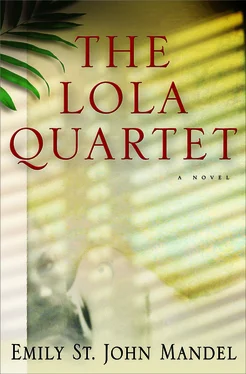". Just a bloodsucking leech," the woman said, at the end of an extended tirade.
"A leech." Gavin was trying to keep his voice mild. "A moment ago you said I was a vulture."
"I'm going to be homeless," she said, "and you're making money off me."
He couldn't argue with this. The arguments Eilo had given him— You're performing a necessary service for a legitimate financial institution, if we don't do this someone else will, it was their responsibility to pay their mortgages and they didn't, etc. — seemed weak as he stood in this peach-and-blue kitchen on a cul-de-sac near his old high school. He looked down at the papers in his hands.
"Perhaps," he said, "you were given bad advice when you signed the loan."
"Perhaps," she said, "you should get the fuck out of my kitchen."
"The next person after me will be a sheriff's deputy," he said. "I'm authorized to offer you—"
"I don't want your cash-for-keys deal. I want the people who are doing this to me to go to prison for the rest of their unnatural lives." Her voice had risen. He saw movement in the doorway. A small child was staring at him. The child's eyes were very large and there seemed to be applesauce on his face.
"I see," he said.
"Including you," she said, although she was losing steam now. There were tears in her eyes. "People like you should probably just die in prison."
"No one did this to you," Gavin said. "You did this to yourself." She was sputtering at him when he left. He drove four blocks, pulled over on a side street and spent some time staring at nothing, at pale stucco houses and close-cut lawns, each house its own kingdom with souls passing through. There were moments when he thought there might be something hidden in his job, some as-yet-ungrasped larger meaning amid all these people, their fear and their sadness and their disappearing homes, but mostly his work just made him dislike houses. These enormous anchors that people tied to their lives.
.
A f e w weeks after his arrival Gavin moved to Sebastian's empty downtown core. It was unclear to him how these streets had become so vacant, why everyone had decided that their fortunes lay on the perimeter, in an ever-expanding sprawl of split-level houses with screened-in back decks and kidney-shaped swimming pools and azaleas and snakes.
"Snakes?" Eilo repeated, in the car on the way to his new apartment with all his worldly belongings in the backseat. She wanted to see his new place. She didn't understand why he was moving.
"Pythons," Gavin said. "They just really bother me, ever since I did that story for the Star."
"That makes no sense, Gavin. It's not like they're slithering all over the backyard."
Pythons weren't the reason. He wanted to be back on concrete, in the company of neon lights. He'd found a one-bedroom apartment above a Laundromat. It was small, but it would be his, and the rent was cheap. The neighborhood was a lost section of grid in between a handful of squat glass office complexes and a mall. His street was barely two blocks long and all but deserted, a parallel row of low run-down buildings that ended in the mall's parking lot, but he felt no menace. This street was only empty, not dangerous. There was an open-all-night Chinese restaurant across from his apartment.
They unloaded the car in the twilight. His worldly belongings didn't amount to much. Two boxes of new clothes, bedding that Eilo was giving him, the carry-on bag that he'd brought from New York.
"You could stay with me for longer, you know," Eilo said.
"I need my own place," he said. "I've been staying with you for weeks."
"You're making good money. You could rent a perfectly nice house somewhere."
"But I don't like houses," Gavin said. "I don't need that much space."
It wasn't just that. It was all the obvious things, of course— he thought he'd feel better about his life if he were living less obviously off the charity of his sister— but it was also that he needed a private base of operations from which to conduct his investigation. All his thoughts were of Anna and the little girl.
Th e m o r n i n g sunlight was brilliant in the new apartment. What was strange was that he felt less alone here than he had in New York. He thought it was perhaps because Karen had never occupied these rooms, therefore her absence didn't fill them. He purchased some cheap furniture, a bed and a mattress, a desk. He filled the second page of his notebook with questions. Why does Daniel Smith dislike me? Where are Chloe and Anna? What does Sasha know? Who were Anna's friends in high school?
It was almost like being a reporter again. He woke every morning thinking of his secret investigation, and it was the last thing he thought of before he went to sleep.
W h o h a d Anna been close to in high school? No one, it seemed, when he examined his memories. Almost everyone had liked her but she had had no close friends. Why hadn't he realized this at the time? He was trying to take notes on the people in her life one evening in the apartment, but his pen was stalled after her half-sister's name. Her friends had been a shifty, druggy crowd whom she'd mostly abandoned by the time he had known her, derelicts from her old school. He didn't know any of their names. She'd been nominally involved in the Drama program after she'd transferred to his school, but only to the extent that she was a stagehand in their productions and helped out with costumes and sets. If she'd had Drama friends, he didn't remember them. She'd been on the outskirts of the music scene, but only because she'd been dating him. She wasn't really interested in the kind of music that was being played at the school. She'd spent time with the quartet and with their occasional singer, Taylor.
He found himself reaching for the phone almost without meaning to. His fingertips still retained the memory of Karen's cell number, the pattern on the keypad.
"It's me," he said.
"It's you." Karen's voice was neutral. "How are you, Gavin?"
"I moved back to Florida," he said. "I lost my job."
"Yeah, I saw that story about you." Her voice softened then, as if she'd seen him wince. "I'm sorry. That's probably the last thing you want to talk about."
"It's okay," he said. "I don't even know why I did it." There was a moment of silence.
"You blew up your career," she said, "and you don't know why?"
"It was difficult after you left," he said. "You know it wasn't what I wanted." She was silent. "And then something happened, I found out I had a—" But children were a terrible topic—"I got some news," he said, floundering. "I was horribly distracted. I think I lost my mind a little bit."
She had nothing to say to this.
"But anyway," he said, "how have you been?"
"I'm okay." She was quiet for a moment. "Florida," she said. "I thought you hated hot weather."
"I didn't have anywhere else to go."
"You always said you'd move to Chicago," she said, "if you ever got tired of New York."
" Maybe I'll go there someday. I've been saving money. You remember that weekend we spent there?" The memory had ambushed him that morning in the shower. It had been spring and the trees were blooming. They'd bought pretzels from a street vendor and looked at the animals in Lincoln Park Zoo. They'd had a picnic and Karen had fallen asleep on the grass in Hyde Park.
"It was a nice weekend," she said. "Listen, Gavin, I have to get back to work. I'd love to talk longer, but. "
"You got a new job? Congratulations." She'd been an administrative assistant at Lehman Brothers until the day the firm collapsed.
"I'm a temporary night-shift proofreader," she said. "It barely qualifies as employment. Goodnight, Gavin."
" Good night," he said. He disconnected and held the phone in his hands for a moment. The apartment was silent except for the air conditioner, the soft hum of the fridge.
Читать дальше












